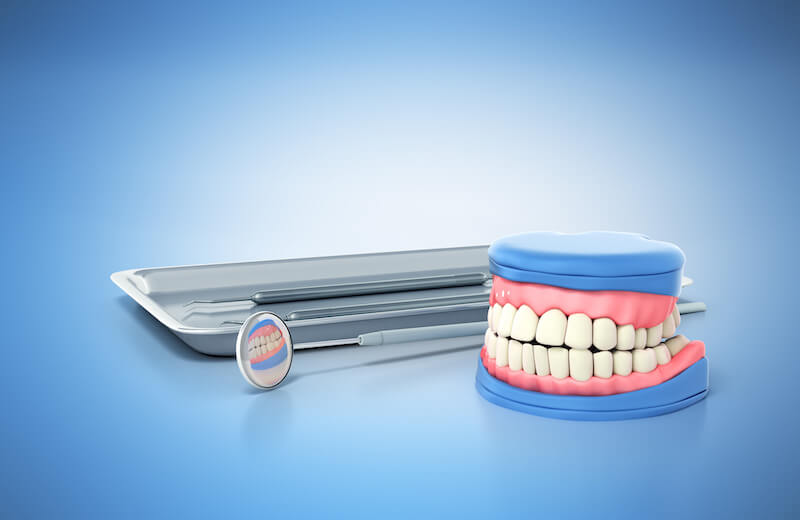
As your body ages, so do your teeth. Our natural teeth become more susceptible to decay and other dental health issues as we get older. Sometimes these dental health issues lead to the extraction of your natural teeth. At Langley Dental Centre, we provide partial and complete dentures for our patients who have lost some or all of their teeth.
How Can I Avoid More Tooth Loss?
In order to avoid tooth loss, regular brushing and flossing are very important. Flossing especially is important in removing food particles that collect between your teeth. An old saying used by dental professionals is “pick out the teeth you want to keep and just floss them!”
The bottom line? Visit Langley Dental Centre in Langley regularly and if you’re having problems, ask your dentist to try everything possible to avoid having your tooth or teeth pulled. Even the best denture isn’t going to be as good as your natural teeth. We do complete and partial dentures here but at best, dentures are a compromise. Discuss all options with your dentist.
Dentures Overview
Dentures are a type of prosthesis used to accommodate missing teeth. These devices are typically removable, but some are bonded or implanted. When all teeth are absent, complete dentures are used. When only some teeth are missing, partial dentures are used. Dentures may be for the maxillary arch, mandibular arch or both.
Warning Signs
Soreness at the corners of the mouth: If your dentures alter the way your mouth closes, saliva may gather in the corners of the lips. This moisture can, over time, lead to conditions or infections like cheilosis or stomatitis. Your dentist can best determine the cause of soreness and how to alleviate it.
Irritation of the gums: Irritation can be caused by food particles rubbing against the gums after getting trapped under the dentures. Friction can lead to sores or bleeding, and if it’s persistent, you should see your dentist in order to rule out other possibilities.
Slippage: If dentures fit appropriately, there should not be an issue with suction. As the mouth changes, the seal between the gums and the device may weaken. If your dentures are not adhering to the way they once did, contact your dentist.
When Dentures Are Prescribed
- When there is difficulty eating due to missing teeth
- When there is difficulty with pronunciation
- To restore the appearance of the patient’s smile and overall facial structure
Types of Dentures
Dentures will fall into one of two groups: partial or complete.
Partial Dentures
Partial dentures, or bridges, are attached to the teeth to fill in gaps where other teeth are missing. Bridges may be removable or may sit in a fixed position using a crown. Bridges help maintain the appearance of a healthy smile while also keeping the remaining teeth in their proper alignment instead of shifting over time.
Complete Dentures
Complete dentures replace an entire arch. Following a few months of total tooth loss, conventional dentures are placed in the patient’s mouth. This is done to allow the gums a chance to heal. Immediate dentures can be used immediately following an extraction, but immediate dentures do not allow for the tissue and bone to settle, which will require adjustment over time. Immediate dentures are generally exchanged for conventional dentures as time goes on.
Patient Experience
- A dentist or denturist will treat you for dentures and instruct you in their care.
- The dentist will take an impression of the dimensions of your jaw and how the arches sit in relation to one another.
- Once the model fits appropriately, the prosthesis will be processed.
You will then be able to wear your dentures. - During the first few weeks, you may be asked to wear your dentures all the time to get used to them and to detect any possible flaws in the design.
- You should steer clear of hard or sticky foods and may need to stick with soft food in small portions until you get used to the prosthesis.
- Talking may be difficult initially, but you should be able to communicate without issue after some practice.
- Because the brain does not immediately recognize this new prosthesis, you may salivate more than usual. Gagging may also occur.
- Dentures may come loose when you cough or laugh. This is normal and easily corrected.
- Follow your dentist’s instructions for how to clean and care for your dentures. Only use adhesive if your dentist approves.
- Your jaw will change over time. Plan to change your dentures every five to seven years for optimal results.
Other Denture Resources
Dentures – Canadian Dental Association – MouthHealthy
Dentures: Types (Partial and Complete), Cost, Cleaning
Partial Dentures, Full Dentures and Denture Care
Dentures, Cosmetic Dentistry | Colgate Oral Care
Know Your Teeth – Infobites – What Is a Denture?

